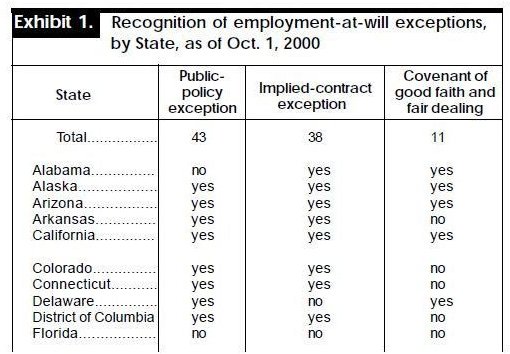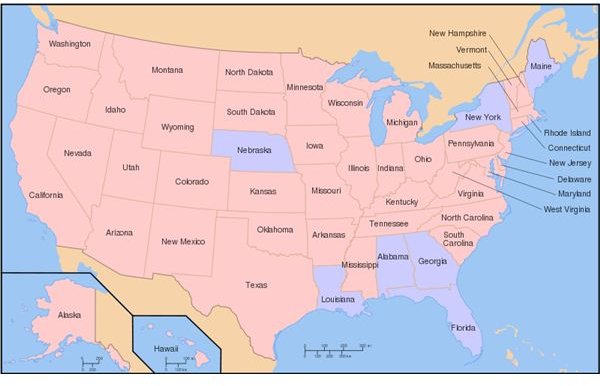What Is the At-Will Employment Clause & How It Protects the Employer
What Is an “At-Will” Clause?
In theory, the “at-will” employment clause, which has been in place since the late 19th century, means the employer/employee relationship can be terminated by either the employer or the employee for any reason, and at any time. Below is the at-will clause that I use in my employee handbook (you have my permission to copy and implement this policy for your own needs):
“Company personnel are employed on an at-will basis. Employment at-will may be terminated with or without cause and with or without notice at any time by the employee or the Company. Nothing in this handbook shall limit the right to terminate at-will employment. No manager, supervisor, or employee of the Company has any authority to enter into an agreement for employment for any specified period of time or to make an agreement for employment on other than at-will terms. Only the President of the Company has the authority to make any such agreement, which is binding only if it is in writing.”
Image Credit (Wikimedia Commons)
How It Protects the Employer

Upon hire, most employers offer the new employee the company handbook, where the employee signs an acknowledgment page that he or she has received the handbook; which contains the at-will employment clause.
Usually, employees go through an orientation period (1 to 3 months) to see how they fit with the company and how the company fits for them. Check with your local Department of Labor on orientation periods versus probationary periods…in some state, a “probationary” period is not legal; however, in all states an orientation period is legal.
During the orientation period or during any part of the employee/employer relationship, either party may terminate employment for any reason. This does allow for employers to get rid of difficult employees or ones that are detrimental to the company or simply don’t do their job—and they don’t have to provide the employee a reason.
The largest law an employer must follow if they do exercise the at-will employment clause is to follow their state’s guidelines on when the employee receives their final payroll check. In some states, like Nevada, if you terminate an employee with the at-will clause, you must have their final paycheck in hand to give them. In other states like New Mexico, you have three days from the date of the termination to provide the former employee with their final wages.
While it sounds great that as an employer you really don’t have to tell the employee why they are being terminated, throughout the years, state governments have revisited the at-will employment clause and there are some pros and cons to the clause depending upon your state.
Image Credit (Wikimedia Commons)
The Pros of At-Will
If you hire an employee and find they can’t do the job required, lied on their employment application about their experience, or just can’t get along with co-workers or follow any direction, you can terminate the employee without giving them a reason.
Final wages are issued and the employee can either file for unemployment insurance or get another job. Usually, an employee that is terminated through the at-will clause is told that the company, if asked for a reference, will only give out hire and termination dates, and position held. Due to lawsuits, most employers these days steer clear of offering additional information about a former employee—even if they are eligible for re-hire.
This seems relatively simple; the employee isn’t working out and as an employer, you don’t have to give a reason why you are terminating the relationship. Done, simple, swift and easy right? Maybe not in some states.
The Cons of At-Will

The US Department of Labor offers a great publication on how the at-will law is governed state-by state. To better understand your state’s guidelines, you can download the publication here.
Here are some of the cons for the at will employment clause:
- Unemployment Claims - If you terminate an employee using the at-will clause, that means you probably haven’t documented the problem with the employee. In this instance if the employee does file for unemployment, it may be hard for you to appeal the unemployment claim without documentation.
- Public Policy Exception – Instituted in the late 1980s, 43 out of the 50 states recognize this policy. The public policy exception to the at-will clause states that an employee cannot be terminated via the at-will clause if the employee was attempting to file a workman’s compensation claim; or if the employer asked the employee to do something illegal to benefit the employer.
- Implied Contract Exception – Thirty-eight of the 50 states do recognize this policy. For example, say you have an employee, new or long-term, and you’ve often told them that “we’re a family; you have a job here for life!” That verbal statement can be taken as an implied contract and state courts may ask you to reinstate the employee if you’ve made statements, whether verbally or in writing, that give the employee job security.
- Covenant of Good Faith Exception – Only recognized by 11 of the 50 states, this covenant looks at both the public policy and implied contract exception and takes them a step further. In states such as Massachusetts or Nevada (both are considered employee proactive states, more than employer), this clause basically outlaws the at-will employment clause and states that if pursued in court, an employer must prove “just cause” as to why the employee was terminated. This means you better have documentation.
Screenshot: By author and courtesy of the US Dept of Labor - At-Will Exceptions
Protecting Your Company

As a business owner, I do utilize the at-will employment clause even though my state does recognize both the public policy and implied contract exception. To protect yourself, download the Department of Labor brochure to see what the rules are in your state. If your state follows one or more of these exceptions, you should be diligent about what you say to employees verbally, in writing, and think about what you are asking them to do—is it legal or are you asking them to do something illegal?
I recommend that all small business owners do implement the at-will clause in their employee handbook as the exceptions only occur if an employee lawsuit is filed. On the other side of the coin, you need to implement an employee documentation or warning system to have proof, if you need it, that the employee was fired for “just cause.”
Most new entrepreneurs are so excited about opening their business; they often put employment issues at the bottom of their list of things to do. Don’t do this and instead, make an appointment with the director of your local Department of Labor and make a list of questions or employee scenarios and be honest with the director about your concerns on following employment laws legally. They can usually guide you on how to implement policies that are legal and binding.
Lastly, avoid using employment contracts if possible. The at-will employment clause does not come into play for contract employees, so skip the contract and only offer a verbal wage or salary and document what was offered in the employee’s file to keep yourself safe. If you try and terminate a contracted employee using the at-will clause, you will be breaking laws set by the US Department of Labor.
Reference: US Department of Labor (https://www.dol.gov)
Image Credit (Wikimedia Commons)
